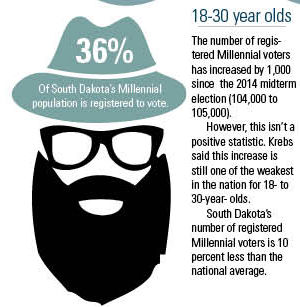South Dakota voting climate: mix of highs and lows
October 26, 2016
There are less than two weeks until the presidential election on Nov. 8.
The window closed Monday, Oct. 24 for people to register to vote for the election in South Dakota. As that passed, South Dakota Secretary of State Shantel Krebs said absentee ballots were on an all-time high trajectory.
As of Oct. 19, there were 40,000 requested absentee ballots. To compare, the 2014 midterm election had 55,000 total absentee ballots cast. Krebs expects the current 40,000 requests to increase well beyond 55,000.
In terms of Millennial registration, however, South Dakota has been relatively stagnant. Since the 2014 midterm election, there has been a voter registration increase in 18- to 30-year-olds from 104,000 to 105,000.
Some SDSU students believe that there is a lack of voting knowledge on campus, which leads to lower registration numbers.
“SDSU just seems like a lot of people don’t know how to vote and most of the people I know aren’t registered,” said Cayleigh Falink-Robinson, freshman apparel merchandising major. “And some other people aren’t going to vote because of the choices.”
Being registered, though, is only the first part of voting. Voter turnout rates for Millennials in South Dakota are below the national average, according to Krebs, at 36 percent.
For 18 to 30 year olds, the national average voter turnout is 46 percent. Bordering states North Dakota, Minnesota and Iowa have a registration rate for 18- to 30-year-olds of 57 percent.
Some Millennial students believe it is their duty to vote in upcoming elections.
“I’m 18 so it’s my first time voting. So I feel like I have to, and I feel like it’s something I need to do as an American,” said Ally Leckband, freshman food science major. “Get out there and vote.”
Leckband is from Iowa and plans on driving home to vote in the election.
As a whole, Krebs said South Dakota typically ranks in the top 10 states for voter turnouts between 60 and 70 percent.
“Almost two out of every three citizens are registered, and we have high turnout,” Krebs said. “We’re pretty consistent across the board and it always spikes in a presidential year.”
The 18- to 30-year-old age demographic remains a lowlight for South Dakota voting data because “we’re lagging in that area nationally and really lagging regionally,” Krebs said.
In order to address this statistic, Krebs is implementing programs such as the Value the Vote tour and the Vote605 app.
The Value to Vote tour focuses on informing and encouraging high school and college students to become registered voters and politically active. The Vote605 app allows voters to look and request sample ballots as well as contact their county auditor.
Along with this nationally low statistic, South Dakota has 62,627 citizens who are eligible to vote but aren’t registered.
Krebs believes this is because of a generational disinterest in politics that stems from social media.
“I think [politics in] social media touches you everyday and gets overwhelming and you can’t get away from it,” Krebs said. “But your vote impacts who you send to Washington or Pierre or your mayor’s office.”
On the other side, Brookings Mayor Tim Reed said social media has positively impacted his public relations with the community. Reed sees an increase in local Brookings politics, which he believes is a fundamental way to become more engaged in all levels of politics.
“At the local level, our voter turnout for local elections has been increasing, which is terrific to see,” Reed said. “ … With local [government] I’ve been thrilled with the number of voters — it shows people are getting more active and you want to see that as a mayor.”
Reed sees websites such as Twitter as informing mediums while he sees websites such as Facebook as more for dialogues to connect community members.
Despite attempts to get students to become more politically engaged, some students at SDSU feel their opinion won’t matter in the upcoming election.
“I’m not into politics so I don’t know what’s going on, so I feel like my vote would be pointless because I would just pick a random person,” said Allison Amelse, freshman undecided major. “I have not heard a single [political] thing from anyone around, I don’t hear anything on politics so I feel like a lot of people don’t know or care.”
Both local and state level officials are urging young people to register and show up on voting day.
“Whether it be a new football field to potentially a state income tax increase or decrease, … someone else makes those decisions but it affects you everyday,” Krebs said. “They’re making decisions with your money.”
























